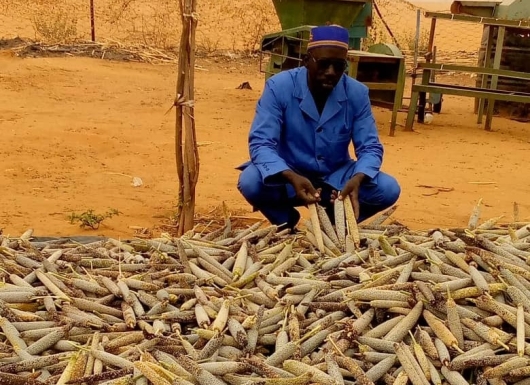Submitter: ICRISAT
“Chakti,” the first biofortified pearl millet variety bred by the ICRISAT in collaboration with the Institut National de la Recherche Agronomique du Niger (INRAN), with funding support from HarvestPlus, is emerging as a vital tool in the country’s strategy to

This variety is bred for high grain Fe (60 mg/kg) and Zn (45 mg/kg) contents. This variety is early maturing with a cycle of 65 days, which is 40 to 50 days lower than the local variety grown by farmers. As a low-cost dietary source of iron and zinc, this iron-biofortified pearl millet has the potential to improve nutrition for millions of farming households.
One of the major advantages of the variety Chakti is its early maturity. While traditional millet varieties typically require 100 to 120 days to reach harvest, Chakti is ready in just 60 to 65 days. This trait is especially valuable in regions facing increasingly erratic rainfall and frequent droughts. Under irrigated conditions, some progressive farmers have even managed to grow Chakti twice a year (https://reca-niger.org/spip.php?article1488). Its earliness makes Chakti a vital solution for addressing the "hunger period"—a time common in the Sahel when households run out of food reserves before the harvest of local varieties.
Since its release, this variety has garnered significant interest among farmers in Niger. The national seed sector has made systematic efforts to upscale this variety and achieved a production demand of 716,457 kg of certified seed during 2024 through collaboration with NARS, farmer group organizations, and private seed companies, which is 11.85% of the total seed produced. According to the 2025 national directory of improved seed varieties availability, Chakti is currently the second most widely produced millet variety in Niger (https://agriculture.gouv.ne/wp-content/uploads/2025/03/ANNUAIRE-NATIONAL_2025-DE-DISPONIBILITE-EN-SEMENCES-DE-VARIETES-AMELIOREES-2.pdf).
In the village of Badaria of the Gabi commune of the Maradi region in Niger where farmers prefer to produce tobacco on the most fertile fields rather than producing food crops (millet, sorghum) or cash crops such as cowpea or peanut, saw the possibility of simultaneously producing millet at the beginning of the rainy season and then continue with tobacco cultivation which usually starts in the middle of the rainy season https://reca-niger.org/IMG/pdf/notela_recolte_du_mil_a_gabi.pdf).
This innovation is in line with the objective of sustainable plant production. The development of the early maturing, high grain-yielding, nutrient-rich crop technologies, and their release in West and Central Africa is not only addressing the climate change issues but also taking care of human health in the rural areas of the region. The availability of the early-maturing lines motivates farmers to diversify the crops and production systems to strengthen and build resilient agrifood systems, which in turn leads to sustainable agricultural development in the Sahel.
ICRISAT works in collaboration with the Ministry of Agriculture of all the countries in the WCA. ICRISAT has strong collaboration with Institut National de la Recherche Agronomique du Niger (INRAN) in Niger, Institut Sénégalais de Recherches Agricoles (ISRA) in Senegal, Savanna Agricultural Research Institute (SARI) in Ghana, L'Institut de l'Environnement et de Recherches Agricoles (INERA) in Burkina Faso, Institut d'Economie Rurale (IER) in Mali, and Lake Chad Research Institute (LCRI) in Nigeria and along with the private seed sector, women cooperatives, and the farmer producer organisations in the region. ICRISAT also has strong collaboration with NGOs and UN agencies such as FAO, WFP, UNICEF, CRS, SNV, World Vision, etc., in the region.
Riyazaddin Mohammed, Riyazaddin.Mohammed@icrisat.org